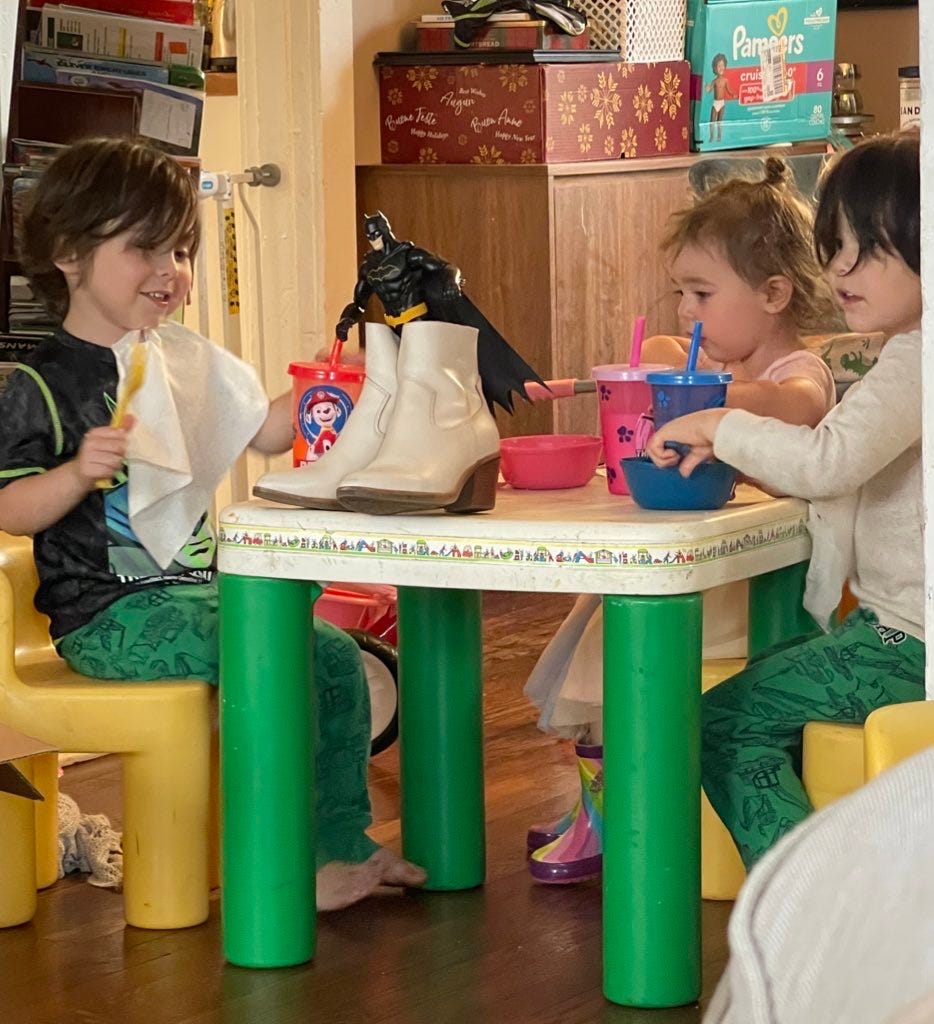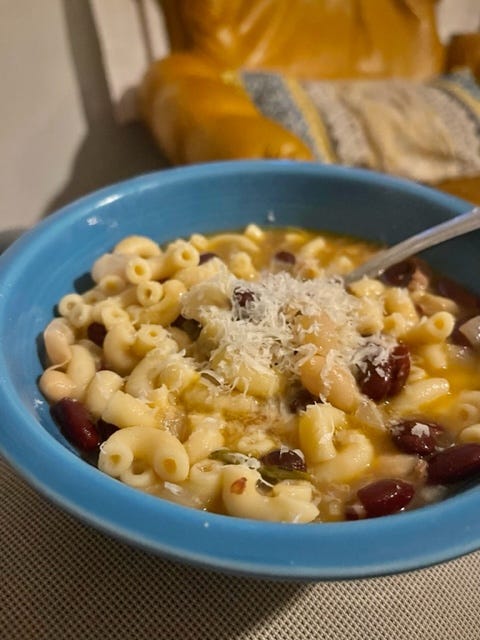The Treasures We Find in the Depths
'Feminine genius' has few limits, but they're all probably toddler-related.
I had planned on writing about birth this week, and about the expectations that we pile on expectant mothers, especially first-time mothers — especially the expectations we create for moms where there are none. It seems our biggest fear in motherhood is that we’ll never have enough double standards to live up to, and the fear is so deep, we create them just so we can never manage to reach them.
But then someone, this week, tried to claim that the reason motherhood feels so miserable and overwhelming — that we feel so “out of our depth” — is that the modern woman is pressed into believing she can have a vocation that isn’t motherhood, thus forcing us all to forgo learning the “old ways” from our foremothers, sending us into spasms of ignorance on the subjects of homemaking, cooking, child-rearing, and apparently fashion, though I’d beg to disagree with that, res ipsa loquitor.
First off, there are treasures in the depths of motherhood. And there’s so much about motherhood you can’t learn, or you refuse to learn, simply because you refuse to accept, on the front end, that you simply don’t know. And the depths of life are great at relieving that: I didn’t know, for example, before I handled toddlers, that I could clean vomit without vomiting myself. I’ve become an expert at getting poop out of all manner of fabrics. I can peel a mandarin orange with one hand, while using the other to keep a naked toddler from mooning a Zoom call.
But secondly, I’ve heard this before, from both anti-feminists — who suggest that feminism forced women to abandon what makes women women in order to seek fulfillment in menial jobs — and feminists like Naomi Wolfe, who suggested, at one point, that stay-at-home moms deliberately hid the difficulties of home-making in some nefarious, underhanded scheme to…actually, I’m really not sure what the end game of the stay-at-home-mom scheme was. But whatever it was, it worked on Naomi, but she was at least paid back with an appearance on Oprah.
But here’s the thing. Motherhood isn’t difficult because of lost knowledge, or because of the alluring glamor of part-time service industry jobs. It’s difficult because it involves tiny humans who are on an endless quest to kill themselves in the most dramatic way possible; tiny copies of yourself that somehow acquired all of your worst qualities, without the attribute of being you. When it’s you who has the terrible personality, at least you don’t have to deal with yourself — that’s someone else’s problem.
Motherhood is just being owned repeatedly by smaller, less tactful versions of yourself.
That makes it hard.
And what else makes it hard? Putting it too high up on a pedastal — so high, its both unachievable and inassailable. We sometimes raise motherhood itself to a virtue, rather than suggesting that motherhood, as a vocation, can be virtuous, just like any vocation to which we are called by God Himself (oh, it got spiritual there, sorry).
Women, you see, aren’t only valuable and virtuous when they have kids. Years of infertility taught me that, as did well-meaning but misguided people who called babies “blessings,” suggesting they were only bestowed on the worthy. What made me unworthy? Sure, I could answer that question for myself, but not in comparison to, say, people on reality television who seemed to pop out kids with alarming regularity. I may not be the best human, but I’m at least a slightly better human than some other people who have kids.
The good news about motherhood, though, is that women are uniquely inclined to it. The “Feminine Genius” that is inherent to the fairer sex, and gives us all these great qualities, like receptivity, empathy, the supernatural gift of being able to picture where something is in the pantry, does make us great at being the default parent at addressing boo-boo emergencies. But it also makes us great at other things, too. Teaching, investigating, counseling, building. We think differently.
If you don’t think we think different, ask your male partner to find something in a kitchen drawer. Go do it. Right now. Be specific. Convey urgency. Only intervene when he cries. Never mind high school sports; the real gender challenge is finding the can opener.
As for the old ways, well, they should make a comeback. Their absence isn’t really to blame for motherhood being difficult, but it is to blame for life being difficult. Teach your kids to cook, sew, make minor car repairs, raise small livestock animals, use snail mail. Some day they’ll have their own insufferable copies of themselves and someone will have to feed those kids, too.
The photo, by the way, is of a coin taken off the sunken ship, the Atocha. There really is treasure in the depths. But you have to get there to find it.
Speaking of feeding, I promised a Pasta Fagioli recipe and I intend to deliver. I realize it’s not really soup weather anymore, but it once snowed in May when I lived in Chicago, so its not a total loss yet.
2 tbsp olive oil or butter
1 large onion, chopped
4 oz. Pancetta, diced (I get it pre-diced and just use the whole package which is more than 4 oz, but its bacon, you can’t go wrong)
4 garlic cloves, diced
Fresh sprigs of rosemary and thyme
Parmesan rind (you can get these from the cheese counter at the grocery store)
1 tbsp tomato paste
2 cans beans, drained and rinsed (I like one can dark kidney beans, one can cannelini)
6 cups of chicken broth (store bought is fine)
1 cup small pasta (I prefer the little elbows since they cook quickly)
Bay leaf
Heat your butter or oil in a dutch oven or soup pot. When heated, drop in chopped onion, garlic, and pancetta. Saute the mix on medium until the onion is soft and translucent. Drop in your drained beans, parmesan rind and herbs (it makes it way easier to fish them out later if you use stalks of rosemary and thyme tie them together with twine), and fill with chicken stock. Add the tomato paste and bring to a boil. Once there, plop the lid on the pot, reduce the heat to low, and simmer for about ten minutes, enough to get the beans to soften.
Open lid, take out your herbs and your parm rind and toss them (where to, your choice). Take a whisk or potato masher and smash up the beans in the broth, just so that you have about a quarter of the beans smushed into bean paste, which will ultimately thicken the broth. Add your pasta, put the lid back on, bring the soup to a boil again, and boil for as long as the pasta package directs (probably about 8 to 9 minutes). Now turn off the heat, wait 5 to 10 minutes for the pasta to absorb some of the broth, and eat.
If you didn’t successfully get a parm rind, you can always buy a block of parmesan cheese and grate fresh parm over your soup. It’s very fancy that way.







I loved this.
Fantastic column!